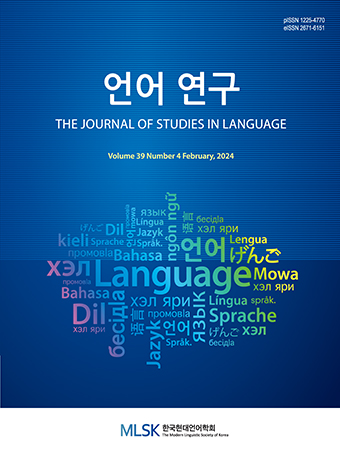Research Article
Abstract
References
Information
Taking a socio-pragmatic approach, the current study explored the production of speech acts of suggestion and advice in English as L2 context. Specifically, the study investigated how Korean learners of English expressed suggestion and advice in terms of strategy use. The study compared the two speech acts realized by Korean L2 learners and native English speakers. The participants encompassed 49 Korean university students and 20 native English speakers. The data consisted of responses to eight situations of written discourse completion test per participant to elicit advice and suggestion speech acts. The responses were coded using 9 categories for advice and 10 categories for suggestion to determine the strategies adopted, and then were analyzed according to the frequency of the choice of strategies for each speech act. Findings revealed that Korean L2 learners of English were not well-balanced in the selection of strategies between making suggestions and giving advice, and linguistic formulae selected to realize certain strategies.
- Al-Darraji, H., T. Foo, S. Ismail, and W. Abdulah. 2013. Cultural Values Underlying Speech Act of Inviting: The Case of Iraqi EFL Speakers. International Journal of Scientific & Engineering Research 4.8, 1051-1057.
- Allami, H. 2012. A Sociopragmatic Study of the Offer Speech Act in Persian. RALS 3.1, 110-129.
- Babaie, S,.and M. Shahrokhi. 2015. A Cross-Cultural Study of Offering Advice Speech Acts by Iranian EFL Learners and English Native Speakers: Pragmatic Transfer in Focus. English Language Teaching 8.6, 133-140.10.5539/elt.v8n6p133
- Bardovi-Harlig, K. and B. Hartford. 2005. Interlanguage Pragmatics: Exploring Institutional Talk. Mahwah, NJ: Erlbaum.10.4324/9781410613776
- Barron, A. 2003. Acquisition in Intrerlanguage Pragmatics: Learning How to Do Thing with Words in a Study Abroad Context. Amsterdam: John Benjamins Publishing Co.10.1075/pbns.10812912817
- Barron, A. 2005. Offering in Ireland and England. In A. Barron. & K. Schneider (eds.). The Pragmatics of Irish English. Berlin: Mouton de Gruyter, 141-176.10.1515/9783110898934
- Barron, A. 2017. The speech Act of ‘Offers’ in Irish English. World Englishes, 224-238. 10.1111/weng.12255
- Blum-Kulka, S., J. House, and G. Kasper. 1989. Investigating Cross-Cultural Pragmatics: An Introductory Overview. In S. Blum-Kulka, J. House & G. Kasper (eds.). Cross-Cultural Pragmatics: Requests and Apologies. Norwood, NJ: Albex, 1-34.
- Brown, P. and S. Levinson. 1987. Politeness: Some Universals in Language Usage. Cambridge: Cambridge University Press.10.1017/CBO9780511813085
- Cheng, S. 2005. An Exploratory Cross-Sectional Study of Inter-Language Pragmatic Development of Expressions of Gratitude by Chinese Learner of English. A Doctoral Dissertation, University of Iowa.
- Darweesh, A. and N. Al-Aadili. 2017. Investigating Iraqi EFL Learners’ Performance in Utilizing the Speech Acts of Advice and Suggestion. International Journal of English Linguistics 7.4, 179-190.10.5539/ijel.v7n4p179
- Dornyei, Z. 2007. Research Methods in Applied Linguistics. Oxford: Oxford University Press.
- Hancher, M. 1979. The Classification of Cooperative Illocutionary Acts. Journal of Language in Society, 9, 1-14.10.1017/S0047404500005911
- Hofstede, G. 1991. Culture and Organizations: Software of the Mind. London: McGraw-Hill.
- Hussein, A. 1984. The Realization of Request in English and Arabic: A Contrastive Study. Unpublished M.A. Thesis, University of Baghdad, Iraq.
- Kasper, G. 1992. Pragmatic Transfer. Second Language Research 8, 203-231.10.1177/026765839200800303
- Kasper, G. and K. Rose. 2002. Pragmatic Development in a Second Language. Malden, MA: Blackwell.
- Koester, A. 2002. The Performance of Speech Acts in Workplace Conversations and the Teaching of Communicative Functions. System 30. 10.1016/S0346-251X(02)00003-9
- Lakoff, R. and S. Ide. 2005. Broadening the Horizon of Linguistic Politeness. Amsterdam: John Benjamins Publishing Co.10.1075/pbns.139
- Leech, G. and J. Svartvik. 1996. A Communicative Grammar of English. New York.: Longman Publishing.
- Lorenzo-Dus, N. 2001. Complement Responses among British and Spanish University Students: A Contrastive Study. Journal of Pragmatics 33.1, 107-127.10.1016/S0378-2166(99)00127-7
- Martinez-FLor, A. 2003. Non-Native Speakers’ Production of Advice Acts: The Effects of Proficiency. Castellon: University Jaume I.
- Martinez-FLor, A. 2005. Theoretical Review of the Speech Act of Suggesting: Towards a Taxonomy for Its Use in FLT. Revista Alicantina De Studios Ingleses, No. 18. Castellon: University Jaume I. 167-187.10.14198/raei.2005.18.08
- Matsumura, S. 2001. Learning the Rules for Offering Advice: A Quantitative Approach to Second Language Socialization. Language Learning 51.4, 635-679.10.1111/0023-8333.00170
- Min, S. 2018. The Speech Act of Offering Advice in Learner English in Korean Context. Journal of Language Science 25.4, 201-219.10.14384/kals.2018.25.4.201
- Olshtain, E. and A. Cohen. 1991. Teaching Speech Act Behavior to Nonnative Speakers. In M. Celce-Murica (ed.), Teaching English as a Second or Foreign Language. Boston: Heinle & Heinle Publishers, 156-165.
- Rose, K. and R. Ono. 1995. Eliciting Speech Act Data in Japanese: The Effect of Questionnaire Type. Language Learning 45.2, 191-223.10.1111/j.1467-1770.1995.tb00438.x
- Spada, N. and P. Lightbown. 1999. Instruction, First Language Influence, and Developmental Readiness in Second Language Acquisition. The Modern Language Journal 83.1, 1-22.10.1111/0026-7902.00002
- Tomson, A. and A. Martinet. 2001. A Practical English Grammar. Oxford: Oxford University Press.
- White, R. 1993. Saying Please: Pragmalinguistic Failure in English Interaction. ELT Journal 47.3., 193-202.10.1093/elt/47.3.193
- Wouk, F. 2006. The Language of Apologizing in Lombok, Indonesia. Journal of Pragmatics 38, 1456-1486.10.1016/j.pragma.2005.09.011
- Publisher :The Modern Linguistic Society of Korea
- Publisher(Ko) :한국현대언어학회
- Journal Title :The Journal of Studies in Language
- Journal Title(Ko) :언어연구
- Volume : 35
- No :1
- Pages :97-108
- DOI :https://doi.org/10.18627/jslg.35.1.201905.97




 The Journal of Studies in Language
The Journal of Studies in Language






